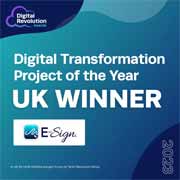Home | News & Insights |
Does HMRC Accept Electronic Signatures?
Adam Ross
Director of Operations
PUBLISHED
3rd February, 2024
HMRC documents are essential for both individuals and businesses, covering a wide range of areas from property transactions to tax filings. As technology advances, traditional paper-based submissions are increasingly being replaced by digital processes, prompting questions about the acceptance of electronic signatures. HMRC does accept electronic signatures on certain digital documents, provided they meet specific requirements for legal validity and compliance.
Which forms can be used with an e-signature?

At the end of 2023, HMRC announced that it would accept e-signatures on certain online forms. Currently, this list includes four forms but the use of electronic signatures might increase across HMRC in the future. The forms in which e-signatures can be used are:
- The P87 (for claiming employment expenses)
- The R40 (for claiming a refund of Income Tax on savings and investments)
- The 64-8 (permitting an agent to act on an employer’s behalf for specified taxes)
- The Marriage Allowance claim (for transferring Personal Allowances)
Digital signatures are only accepted on the above forms. On all other forms, you will be required to obtain a handwritten or ‘wet’ signature. Whilst it is a positive step towards greater efficiency some forms can use e-signatures, for individuals, bookkeepers and accountants, having to convert a wet signature into a digital one is a time-consuming process. Hopefully, there will be further updates to HMRC that enable more forms to utilise secure electronic signatures.
Upcoming deadlines for tax returns
For those who are self-employed or registered as sole traders, this time of year is crucial for filing tax returns. The deadline for submitting paper self-assessment tax returns was 31st October 2024. While the deadline for online submissions is 31st January 2025.
The only time that the tax return deadline may change in the UK, is if you receive notice from HMRC telling you to submit an online tax return after 31st October. In these instances, the individual will have three months to submit the return from the date of notice.
What if you miss the tax return deadline?
If you’re submitting your tax return online and you don’t submit it on time (by 31st January 2025) you could face the following penalties:
- You may be charged a fee for paying the tax even one day after the self-assessment deadline
- Paying three months after the deadline can incur a fine of up to £1,000
- If you pay your tax bill between six and twelve months after the deadline you might have to pay an extra £300 on top of your earlier fines. In some cases, you can be fined 5% of your tax bill, which may be more costly
- If you pay your bill more than twelve months late, you will face another £300 fine or 5% of your tax bill, as well as all the other penalties. In more serious instances, you can be fined 100% of the tax owed on top of your original tax bill
Are e-signatures legally binding in the UK?
Yes, electronic signatures are legally binding in the UK and have been since the introduction of the Electronic Communications Act in 2000. Also, electronic signatures are regulated by the UK-amended version of the eIDAS regulation.
In previous years following the introduction of the Electronic Communications Act, there was still some uncertainty around the use of e-signatures and their legality. However, in 2019, the Law Commission stepped in to resolve this remaining ambiguity, confirming the validity and legality of eSignatures in executing documents, including where there is a statutory requirement for a signature.
How can E-Sign support accountants and tax?
Accountants are required to prepare full annual accounts and company tax returns, which need to be signed. They often have to manage high volumes of compliance paperwork with strict deadlines and processes to follow.
As an industry-leading secure electronic signature and digital document solutions provider, E-Sign can help accountants and bookkeepers speed up their document processes and increase efficiency. Our advanced electronic signatures meet the requirements of HMRC, offering complete assurance that the documents and signatures signed through E-Sign are legally valid.
Each signature comes with a detailed audit trail and multi-factor authentication to ensure the authenticity of the document and the validity of the signer. With E-Sign’s electronic signature and document management platform, you can eliminate paper-based administration. Moving these processes online to improve efficiency, reduce turnaround times and facilitate productive collaboration between your colleagues and customers.
Updates to HMRC regulations
HMRC has confirmed that from 6th April 2025, tax repayment agents will be required to use advanced electronic signatures when obtaining authorisation from clients to submit documents on their behalf. Agents should keep evidence of their registration with an advanced electronic signature provider. This can be in the form of a headed letter or email invoice that confirms your company has purchased an advanced e-signature solution.
This evidence will need to be provided to HMRC upon request and claims will not be processed until the right documentation is submitted. This update demonstrates that HMRC is increasingly allowing and approving the use of digital signatures in their processes in order to increase efficiency and accuracy with secure and legally binding electronic signatures that confirm identity and intent to sign.
Interested to find out more?
Contact us today to discuss your electronic signature needs and our digital transformation team will be able to ensure you receive a tailored solution that meets your requirements. You can also get started with E-Sign by registering for our 14-day free trial. This will allow you to explore the features and functionality of the platform for yourself and see how it could work for your business.
 Facebook
Facebook
 X (Twitter)
X (Twitter)
 LinkedIn
LinkedIn











